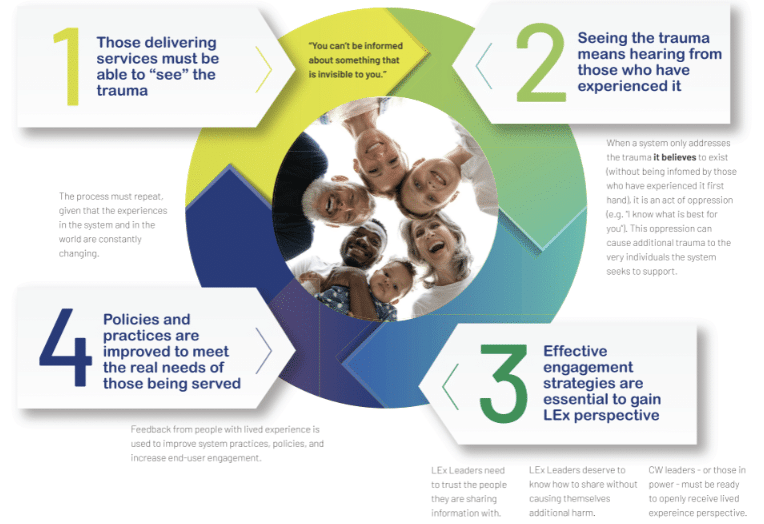Elevating Youth Voices in Trauma-Informed Care
Youth Voices in Trauma-Informed Care
Written by Binley Taylor
The National Center prioritizes the inclusion of lived experience voices in everything that we do. In order to improve mental health services for children and youth, we must all listen to and learn from those who have experienced child welfare and mental health systems. Binley Taylor worked with Faith Sharp, a LEx Leader, to write this post.
To be truly trauma-informed, it is crucial for those delivering services to recognize and understand the trauma experienced by those they serve. This understanding is only possible by listening to the voices of people with lived experience (LEx). Seeing the trauma means hearing directly from those who have lived through it.
Faith Sharp, an individual with lived experience in foster care, highlights what makes someone with such a background a good leader. She emphasizes the importance of being flexible, working towards goals, and keeping track of one’s ideas. Faith feels empowered when adult stakeholders listen to her ideas and experiences. She believes that often her insights offer a unique perspective that others may not have considered, and it’s rewarding when her experience can blend into the work. As she continues to grow as a professional, she hopes to be heard not just as someone with lived experience but also as an expert in the workforce.
For LEx leaders to be willing to share their trauma, three key conditions must be met:
Trust: LEx individuals need to trust the people they are sharing information with.
Safety: They deserve to know how to share without causing themselves additional harm.
Readiness: Child welfare leaders, or those in power, must be ready to receive this information, embracing power-sharing and other LEx engagement strategies.
Faith shares that in her current work, she is part of changing the foster care system in small ways every day. Sharing her story is a significant part of this work. She advises adult stakeholders to avoid calling out youth in meetings but instead to create spaces for them to provide feedback. “Every room is a space for lived experience voice if you have a desire to include it,” she says. Tokenistically including LEx voices without genuine engagement contradicts the essence of meaningful inclusion.
Effective engagement strategies are essential for meaningful participation. Here are some key strategies to ensure effective engagement of LEx leaders :
Create Safe Spaces: Ensure environments are supportive and non-judgmental.
Provide Training: Equip LEx leaders with skills and knowledge.
Offer Compensation: Recognize their contributions with fair compensation.
Youth/Adult Partnerships: Encourage partnerships between LEx leaders and professionals.
Continuously Seek Feedback: Use feedback to improve engagement and system practices.
Policies and practices need to be improved to meet the needs of those served. This means adopting trauma-informed practices that truly understand and address the experiences of LEx individuals. By listening to and incorporating the voices of LEx leaders, the foster care system can make significant strides toward better outcomes for all.
Faith’s journey and insights remind us that the inclusion of lived experience voices should be genuine and integrated into every aspect of the system. This approach not only enriches the work being done but also empowers those with lived experience to lead and innovate within the system.

